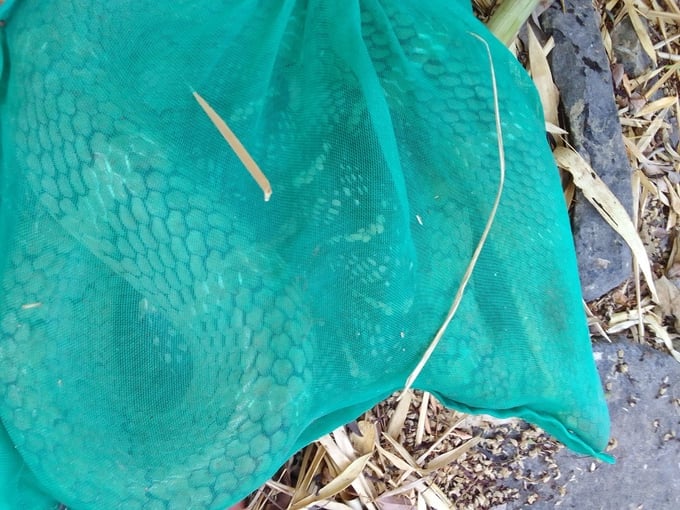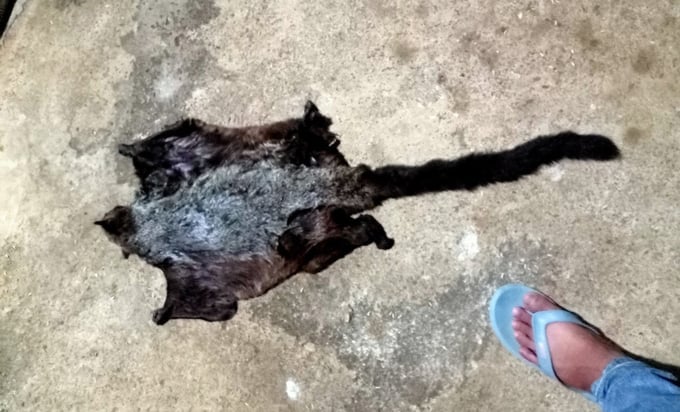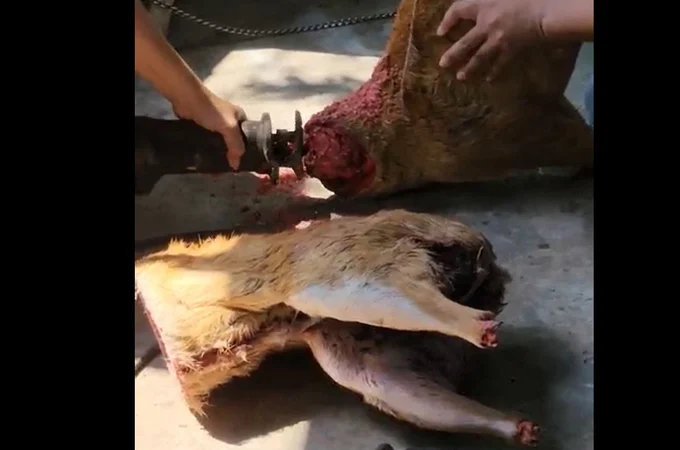May 23, 2025 | 14:07 GMT +7
May 23, 2025 | 14:07 GMT +7
Hotline: 0913.378.918
May 23, 2025 | 14:07 GMT +7
Hotline: 0913.378.918
Yok Don National Park boasts a rich biodiversity, with a staggering 650 species of vertebrates, comprising 92 mammal species, 373 bird species, 112 fish species, 55 reptile species, and 18 amphibian species. The park harbors a trove of rare and endemic animals, each possessing unique characteristics. Notably, 46 mammal species listed in the Vietnam Red Book (constituting 50% of the park's mammal species) and 35 globally rare and precious mammal species according to the 2020 IUCN report (representing 38.9% of the park's total species) call Yok Don National Park home.
The high conservation value of the park's mammal fauna is underscored by large mammals such as elephants, bison, gaur, deer, chamois, and various carnivores. Unfortunately, this ecological haven has become a hotspot for illicit animal hunting, mainly targeting rare species listed in the Vietnam Red Book.

Cobras, fetching prices ranging from 600,000 to 800,000 VND/kg, are among the sought-after commodities in the illegal wildlife trade. Photo: Quang Yen.
Following a lead, a reporter contacted an individual identified as A.H., residing in Tul A village, A Wer commune, Buon Don district, to inquire about purchasing wild animals. Subsequently, A.H. disclosed insights into the illicit practices of hunting wild animals within Yók Don National Park.
According to A.H.'s revelations, procuring these goods requires a reservation to enable him and his cohorts to venture into the forest for procurement. During this season, the primary targets in the hunt are wild boars, deer, and squirrels. However, securing rare specimens like iguanas, cobras, or flying foxes proves more challenging, particularly because monitor lizards typically emerge in late April or early May with the onset of rain. Consequently, they are scarcely encountered in the forest during this season, commanding prices of 200,000 VND/kg, whereas in-season prices plummet to 180,000 VND/kg. Despite the diminished availability, king cobras remain elusive this season, fetching prices as low as 500,000 - 700,000 VND/kg, rendering them unattractive for capture. Typically, buyers acquire them at 800,000 VND/kg, remarked A.H.
Furthermore, A.H. elaborated that orders necessitate forays into the forest, where cobras typically weigh between 1.5 - 5kg, whereas monitor lizards, varying by type, include 3.5kg infants. A.H. assures flexibility, catering to preferences for smaller sizes if desired. Notably, all specimens originate from Yók Don National Park's forest. A.H. emphatically advises against retaining these animals after procurement, citing significant danger.

Flying ferrets are listed in Vietnam's Red Book, hunted by people in Yok Don National Park, and sold for 800,000 VND each. Photo: Quang Yen.
A.H. then presented an offer for cotton squirrels at 400,000 VND/kg, subsequently reducing the price to 350,000 VND/kg upon the reporter's critique. However, A.H. clarified that immediate availability was not feasible, necessitating advance orders for forest hunts. "Upon my return from the forest, I immediately sold them due to the high demand. Many buyers resort to advance orders to secure their desired goods," A.H. reiterated.
Similarly, N.V.A. from Buon Don district, Dak Lak province, extolled the region's wild meat as a prime specialty of the Central Highlands. Buon Don is one of the province's largest reservoirs of wild animals, courtesy of Yók Don National Park. The local woodsmen engage in daily trapping and hunting activities, producing abundant wild animals. Not only does this cater to local traders, but it also caters to the demands of Buon Ma Thuot City and other major cities within the province.
"When I return to Buon Don district, indulging in wild food is necessary. The meat of freshly caught wild animals here, unlike the frozen fare found in city restaurants, boasts superior flavor and ensures an authentic wild dining experience," asserted Mr. A.
Reflecting on his past, Mr. A. disclosed his former occupation in the timber industry, which he abandoned due to forest depletion. Many of his former colleagues, once loggers under his employ, have transitioned to trading or hunting wild animals to satisfy traders' demands.
Guiding us through Drang Phok village in Krong Na commune, Buon Don district, Mr. A. introduced us to the indigenous people engaged in wild animal hunting and trapping. "Most of these individuals belong to ethnic minority groups residing deep within the forests. As the forests dwindled, they turned to hunting for sustenance. Now, with the depletion of wild animals, some venture into the forests for weeks in pursuit of game. The modest proceeds from selling a few animals barely sustain their impoverished livelihoods year-round. It is only the traders and traffickers of wild animals who reap substantial profits," lamented Mr. A.
Mr. A. proceeded to enumerate a roster of restaurants and wild animal dealers in Buon Don district, cautioning that these establishments exclusively cater to familiar traders; strangers seeking to purchase are met with circumspection.
As the Central Highlands transitions into the dry season, communities surrounding the buffer zone of Yók Don National Park clandestinely infiltrate the forests to illegally hunt wild animals. During this period, when vegetation burns, forest-dwelling creatures seek refuge in semi-evergreen and evergreen forests, congregating near water sources like lakes and puddles. Exploiting this behavior, many intensify their hunting, shooting, and trapping activities during the dry season.
According to a local acquaintance in Buon Don district, acquiring wild animals necessitates acquaintance or local endorsement. Despite repeated requests for assistance, eager buyers swiftly seize the rare opportunity to procure recently caught wild animals before they can even inspect the goods.
Upon inquiry, a reporter was informed of a flying fox available for purchase at 800,000 VND in a specific incident. Expressing interest, the reporter intended to examine the merchandise, only to receive a call five minutes later, notifying them that the animal had already been sold.

The illicit wildlife trade continues unabated despite ongoing efforts by authorities. Photo: Quang Yen.
As rivers and streams dwindle during the dry season, animals congregate in remaining wet areas to quench their thirst. During this period, encounters with wildlife, including species listed in the Red Book, such as king cobras and flying foxes, are most frequent. Opportunistic individuals seize upon this, capturing these animals and selling them directly to restaurants or interested parties via informal channels. However, acquiring these goods requires familiarity or a trusted referral.
In one instance, a cobra weighing approximately 4kg was caught while laboring in the fields. Offered for sale at 600,000 VND/kg, the snake was promptly snapped up by a higher bidder before the reporter could inspect it.
Selling wildlife is not confined to specific seasons; products are frozen and stored, ready for sale whenever demand arises. Despite the cycle of sanctions and awareness campaigns conducted by authorities, the underground trade in wild animals persists, posing a grave threat to the region's biodiversity.
Translated by Quynh Chi

(VAN) The People's Committee of Tra Vinh province has approved an adjustment to the investment policy for the Green Hydrogen Plant project, increasing its area to approximately 52.76 hectares.
![Reducing emissions from rice fields: [2] Farmers’ commitment to the soil](https://t.ex-cdn.com/nongnghiepmoitruong.vn/608w/files/news/2025/05/05/dsc08881jpg-nongnghiep-140632.jpg)
(VAN) Clean rice cultivation model in Thuong Tan commune, Bac Tan Uyen district, is assisting local residents in achieving sustainable agriculture by substantially reducing costs, increasing productivity, and protecting the environment.

(VAN) At the conference to disseminate Resolution No. 68, AgriS introduced its digital agricultural ecosystem and reaffirmed its commitment to accompanying the Government in promoting private sector development and sustainable agriculture.

(VAN) 'Blue Ocean - Blue Foods' initiative is designed to restore marine ecosystems and establish sustainable livelihoods for local communities by cultivating a minimum of 1,000 hectares of cottonii seaweed in the first three years.
/2025/05/21/4642-3-112707_603.jpg)
(VAN) The V-SCOPE project has made direct contributions to three out of six pillars of the Comprehensive Strategic Partnership between Vietnam and Australia.

(VAN) Facing the threat of rabies spreading to the community, Gia Lai province urgently carries out measures to vaccinate dogs and cats on a large scale.

(VAN) Disease-free livestock farming not only protects livestock herds but also stabilizes production and livelihoods for many farmers in Tuyen Quang.